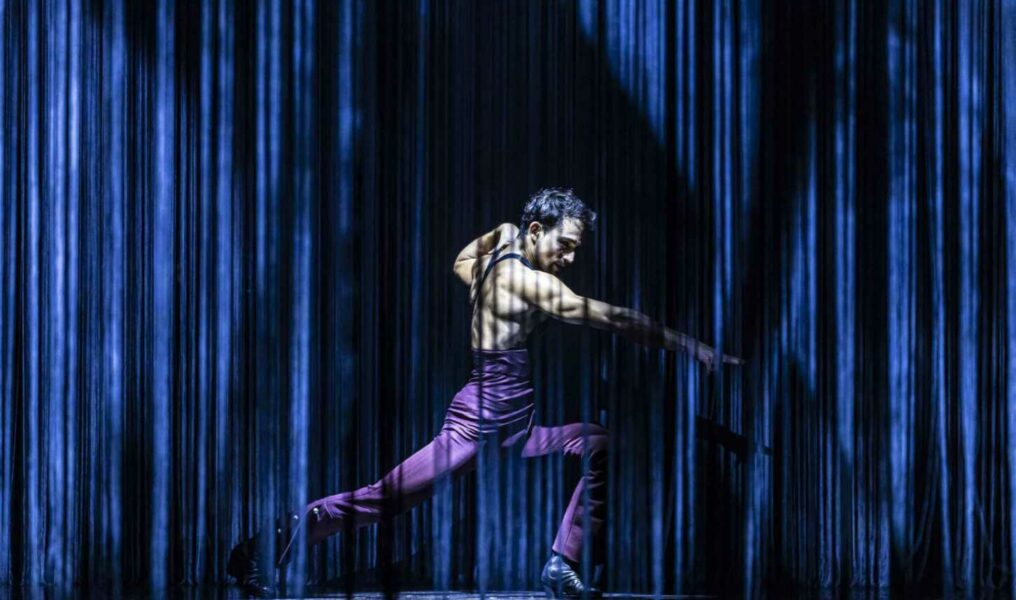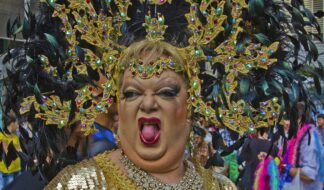This Detroit Opera Production on Federico García Lorca Bulldozes the Gender Binary
Actress Daniela Mack plays Lorca, but it gets even queerer

This April, the Detroit Opera will bring a fresh and unusual piece to the stage — Osvaldo Golijov’s "Ainadamar: Fountain of Tears." Fresh, because it’s relatively new, in operatic terms; the piece premiered in 2003 at Tanglewood in Massachusetts. Unusual, because this stunning work brings together classical operatic forms and technique, flamenco instrumentation and technique, and surrealist imagery to create a wild ride of a performance. I’ve heard a lot of opera in my time, and I’ve never heard anything like this before.Golijov’s opera is named after Fuente de Aynadamar, a teardrop-shaped fountain in Granada where blue-green water burbles beneath olive and plane trees. Its name, which means Fountain of Tears in a combination of Spanish and Arabic, was given due to the shape of the 11th-century structure. It was only many centuries later, in 1936, that the name would prove prescient; it became the chosen location for multiple nationalist assassinations during the Spanish Civil War. Among those who were shot in the dead of night for resisting Franco’s dictatorship was an eminent young poet named Federico García Lorca.Lorca is also one of three main characters in "Ainadamar," which conjures him as a sort of patron spirit of Spanish art and contends with his violent death at the hands of fascist soldiers, a murder committed equally due to his politics and his homosexuality. His story is told by his friend and muse, Margarita Xirgu, who relates her relationship with Lorca to her friend and student, Nuria, in a series of arias and recitatives. As she calls to mind the restless but brilliant mind of Lorca, he appears before us to relive his demise. Xirgu is brokenhearted, adamant that she should have convinced him to flee. Lorca is forgiving, even as he is arrested and shot, insisting that Spain is his love, Spanish his language, the Spanish people his brethren.To say that Golijov’s musical choices are unorthodox is a major understatement. Right off the bat, the first prelude makes use of an audio sample of hoofbeats on cobblestones, over hauntingly brassy trumpets and a droning contrabass ostinato. The effect is of being both haunted and pursued by angry soldiers at once. The prelude then transitions into a powerful groove played on a flamenco cajon, before introducing a chorus singing in wide open vocal technique, common in flamenco but definitely not in opera (which uses more closed vowels) before stopping all at once to give space for handclaps. Only then does Margarita enter with her heart-rendingly perfect soprano performance.That’s the first five minutes. It gets even more gorgeous as the opera, directed by Deborah Colker, goes on.“When I first got the inquiry from my agent, I went on Spotify [to hear the piece] and immediately knew it was unlike anything that I've ever done,” says Daniela Mack, who will be performing in the role of Lorca. “It piqued my interest right away, especially seeing that this role sits so low, so much lower than anything else that I’ve sung.”

Mack is no stranger to playing male roles (mezzo sopranos often find themselves in operatic drag), but this role feels different to her. Often, she finds herself trying to inhabit a traditionally masculine guise. Here, though, the composer is intentionally creating an opportunity for gender-bending.“There's a certain freedom in the interpretation,” says Mack. “Here's this man who, according to what I’ve read, had a softness to him. And there’s this sort of ambiguity, this element of the androgynous about him in this iteration. It's freeing for me to not have to think so much about presenting ‘masculine.’ It’s just about finding the kernel of who the human was and what he stood for. It’s about identifying what about him as a human I identify with. It's a beautiful experience, discovering this character.”Indeed, the whole opera strays from the long-accepted format of recitatives (pieces that are more spoken and drive the plot forward) alternating with arias (performative songs that express the emotional landscapes). One notable feature of "Ainadamar" is the sparseness of solo pieces, giving more stage time to either trios, duets, or choral moments. That’s not to say that there are no arias; opera lovers will get their resplendent solo works to swoon over (I certainly did). It’s just that this work seems more about the collective than about the individual, in keeping with Lorca’s work and ethos.This collective-first mentality is not lost on the creative team. “Normally, at the beginning of a rehearsal, the director singles out the main characters, but there was none of that here,” says Mack. “Our director gathered us and said, very intentionally, there is no art without unity. Yes, there are primary characters, but nobody has more importance than anybody else. If you have a moment where you sense that two people on stage are not connected, then the piece doesn't work. There's no success, no thriving without equality.”Despite coming from privilege, Lorca was enchanted by and dedicated to the marginalized peoples of Spain, perhaps because he, himself, suffered persecution as a gay man in a fundamentalist Catholic country. He wanted to give everyone a voice, to celebrate the multifarious facets of Spanish society. This desire comes through in the libretto — when Xirgu tries to convince Lorca that he must flee to Havana (she sings a lively and lilting melody, describing the dreamlike life they could live in Cuba).Lorca, for his part, replies “quiero cantar entre las explosiones” (I want to sing amid the explosions) in a recitative-esque duet with Xirgu. The words are, appropriately, set over traditional flamenco and Arabic orchestration and harmonic flavors. A casual listener might think they were listening to live music in a town square in Granada. The message comes through loud and clear: to leave his country and its people for personal salvation would be unconscionable.There are a great many reasons to love this opera. The music alone is fascinating and powerful, opening doors to new vistas of sonic amalgamations. The story is important, told by way of a compelling libretto. And, of course, it’s an important part of LGBTQ+ history that needs to be told, and not only because Lorca was gay (although that’s crucial as well).The very foundation of the piece feels queer to me, the way it underlines collective freedom over individual exploration, the liberty it finds outside the rigidity of the gender binary, the space it makes for different kinds of identities and love. In a world that feels increasingly regressive, "Ainadamar: Fountain of Tears" offers new winds of change."Ainadamar: Fountain of Tears" will play April 8, 14 and 16 at Detroit Opera, located at 1526 Broadway Street in Detroit. For more information, visit detroitopera.org.









